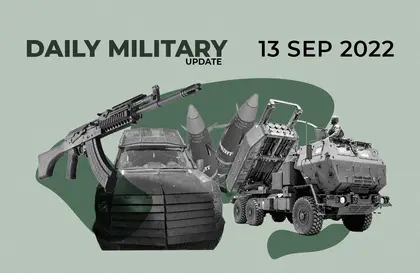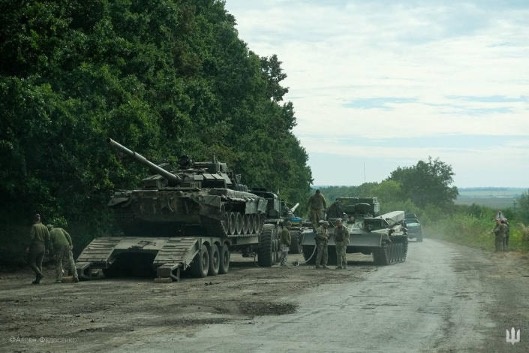The Ukrainians are now officially calling it “Russian Lend Lease”.
Now in its second week, the Ukraine Armed Forces (UAF) devastatingly successful Kharkiv offensive has transferred hundreds of combat vehicles and hundreds of tons of ammunition and supplies to Kyiv’s control.
JOIN US ON TELEGRAM
Follow our coverage of the war on the @Kyivpost_official.
Ukrainian soldiers have, according to official statements and individual accounts, captured substantial numbers of Russian weapons that are intact and vehicles in good running condition. One UAF fighter, by his account a member of the 80th Airborne Assault Brigade, on September 11 posted a video of a Russian T-80BVM tank with less than 900 motor hours on the clock.
- Check out the freshest Ukraine news items as of today.
“This thing is practically straight from the showroom,” the UAF soldier said. Other sources geolocated the video to a former Russian maintenance base on the outskirts of the city of Izyum. Kremlin troops fled the sector over the weekend, by all accounts, excepting Russian state-controlled media, which still claims the retreat was really a planned “redeployment” – leaving hundreds of millions of dollars worth of useful military behind them, for the Ukrainian military to use.
Anton Herashchenko, trolled the Kremlin on September 11, calling the bounty of arms and ammunition gathered by the UAF “Russian Lend Lease.”
Patriotic Ukrainian social media platforms, likewise tongue-in-cheek, are now widely, and by some standards accurately, calling the Russian army the single most generous contributor of military hardware to Ukraine’s national defense, even compared to the United States.

ISW Russian Offensive Campaign Assessment, January 22, 2025
Ragnar Gudmundsson, an Iceland-based political scientist and military data researcher, in a Tuesday, September 13 combat loss count published on multiple media platforms estimated that over the course of Ukraine’s present offensive, by his count begun on August 29, more than half (55.1%, currently) of all weapons and equipment lost by the Russian military, was captured by the Ukrainian military.
By that estimate, based on open-source reports and images, over the past two weeks at least 298 major Russian weapons systems, including tanks, artillery systems and infantry fighting vehicles became Ukrainian government property. RF military equipment losses were particularly heavy on September 12: 61 weapons systems abandoned by Russian soldiers, over only 24 hours.
On the ground, evidence of those Russian losses has manifested in thousands of images of jubilant UAF soldiers crawling over expensive Russian kit and chortling over the windfall. A video traced to the north Kharkiv sector, made public over the weekend, showed fighters from a mechanized infantry unit poking around inside a rare and apparently intact Russian 1L261 radar vehicle. The fighter says the high tech weapon will be “much appreciated” by the Ukrainian military. He then grabs a collapsible fishing kit, probably left behind by a retreating Russian crew member, as a personal “bonus”.
Oryx, a Netherlands-based military data watch group tracking combat losses in the Ukraine war, said that the volume of Russian vehicles damaged, destroyed and captured over the weekend was close to unprecedented for the entire war.
Those numbers, moreover, may well be low-balls. Estimates by independent analyst groups like Oryx are based solely on losses fully confirmed in open source materials, and are almost certainly lower than reality. Ukraine’s Defense Ministry currently calculates that the RF has lost 1,361 major weapons systems since the beginning of September to all causes – more than double estimates made by independent agencies.
Images from the field seem to confirm UAF claims of wholesale abandonment of an army’s worth of military equipment by Russian troops fleeing the Kharkiv sector. A video published by Ukraine’s Ministry of Defense on September 11 shows UAF infantryman walking along a road littered with top-line Russian T-80 tanks and MTLB armored personnel carriers. “F*ck there is enough tanks for everyone. What a bonus!” a soldier says. “Look, ammo! Take the ammo!”
A Kyiv Post review of images posted from the Kharkiv sector over the past week showed UAF soldiers having captured most types of ammunition in the RF inventory, much of it still widely used by the UAF. Ammunition box counts appeared to be in the hundreds at some locations.
Ammo identified in the review included 5.45mm rifle and 7.62mm machine gun ammunition, RPG-7 anti-tank and RShF-1 thermorbaric rockets, 30mm automatic grenades, 82mm and 120mm mortar bombs, 125mm tank main gun rounds, anti-personnel and anti-tank mines, 122mm and 152mm howitzer shells, 9M111M Faktoria guided anti-tank missiles, and 220mm artillery rockets. At some locations, images showed ammunition box piles towered four meters high.
Nor has the Kyiv’s military bounty been just in conventional weapons. According to posts from Ukrainian aviation social media, UAF troops in the Kharkiv sector found the debris of a top-of-the-line Russian Su-30SM Flanker-H fighter jet, with an almost intact RTU 518-PSM jamming pod still on one of its wings.
The jammer, part of Russia’s Khibiny family of electronic warfare systems, is a key piece of Russian military aircraft defenses: when it works, enemy anti-aircraft radars have great trouble targeting a Russian jet. The highly-secret Russian jamming pod, captured on Friday, September 9, is likely en route to a NATO scientific team for study and reverse engineering, posters speculated.
You can also highlight the text and press Ctrl + Enter











